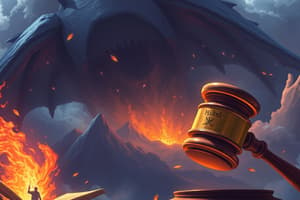Podcast
Questions and Answers
What does obscenity refer to?
What does obscenity refer to?
- Material that causes disgust and is offensive (correct)
- Works that are subject to fair use
- Material that is legally protected
- Content that is universally accepted
Which of the following is NOT a right granted by copyright?
Which of the following is NOT a right granted by copyright?
- Reproduce
- Prepare derivative works
- Distribute
- Claim authorship on someone else’s work (correct)
Plagiarism can best be defined as:
Plagiarism can best be defined as:
- Working collaboratively on a project
- Citing sources incorrectly
- Using one's own work improperly
- Claiming another's work as your own (correct)
What is an example of fair use?
What is an example of fair use?
Which principle is NOT part of good netiquette?
Which principle is NOT part of good netiquette?
What does 'Know where you are in cyberspace' refer to?
What does 'Know where you are in cyberspace' refer to?
What is meant by 'respecting other people’s time and bandwidth'?
What is meant by 'respecting other people’s time and bandwidth'?
According to netiquette, how should one handle mistakes made by others?
According to netiquette, how should one handle mistakes made by others?
What must a plaintiff prove to win a defamation case?
What must a plaintiff prove to win a defamation case?
Which of the following is an example of slander?
Which of the following is an example of slander?
Which of the following behaviors does NOT typically constitute bullying?
Which of the following behaviors does NOT typically constitute bullying?
What is a common characteristic of cyberbullying?
What is a common characteristic of cyberbullying?
What does R.A. 10627 address?
What does R.A. 10627 address?
What is the primary concern related to privacy in the context of social media?
What is the primary concern related to privacy in the context of social media?
How does obscenity differ from pornography?
How does obscenity differ from pornography?
What is NOT a reason for protecting privacy?
What is NOT a reason for protecting privacy?
Flashcards
Defamation
Defamation
A statement that hurts someone's reputation.
Libel
Libel
Written defamatory statements.
Slander
Slander
Spoken defamatory statements.
Cyberbullying
Cyberbullying
Signup and view all the flashcards
Privacy
Privacy
Signup and view all the flashcards
Bullying
Bullying
Signup and view all the flashcards
Obscenity
Obscenity
Signup and view all the flashcards
Pornography
Pornography
Signup and view all the flashcards
Copyright
Copyright
Signup and view all the flashcards
Plagiarism
Plagiarism
Signup and view all the flashcards
Fair Use
Fair Use
Signup and view all the flashcards
Netiquette
Netiquette
Signup and view all the flashcards
Respecting others' time
Respecting others' time
Signup and view all the flashcards
Respecting other's privacy
Respecting other's privacy
Signup and view all the flashcards
Responsible power use
Responsible power use
Signup and view all the flashcards
Study Notes
Legal, Ethical, and Societal Issues in Media and Information
- Defamation involves statements that harm a person's reputation.
- Libel refers to written statements.
- Slander involves spoken statements.
- To win a defamation case, a plaintiff must prove:
- A false statement of fact was made.
- The statement was communicated to a third party.
- Fault was involved.
- Damages were caused to the subject of the statement.
- Bullying is defined as severe or repeated abuse of a student.
- It includes verbal, written, electronic, or physical abuse.
- Bullying can cause physical or emotional harm to the victim or damage the victim's property.
- Bullying may even create a hostile environment for students.
- Cyberbullying uses technology (computers, laptops, phones) to harass others.
- Examples include posting embarrassing pictures or videos, sending threats or hurtful messages.
Privacy
- Privacy is freedom from unauthorized intrusion and personal information protection.
- Oversharing online can put privacy at risk which can lead to stalking or harassment.
- Protecting privacy involves:
- Privacy functions (blocking, reporting).
- Self-discretion.
Obscenity and Pornography
- Obscenity and pornography are related but different.
- Pornography uses nudity for sexual arousal.
- Obscenity involves material that is considered disgusting and offensive.
Copyright
- Copyright protects original works of authorship.
- Copyright rights include:
- Reproduction
- Distribution
- Performance
- Creating derivative works
- Protected works include:
- Images
- Written works
- Audio content
- Performance arts
- Copyright violation is plagiarism.
- Fair use limits copyright holder’s exclusive rights, but usage must conform to established parameters for educational purposes.
Netiquette
- Netiquette is a set of online behavior guidelines.
- Good netiquette is based on general real-life behavior standards.
- Key points of netiquette:
- Remember the human (consider the other person/s).
- Maintain real-life standards of behavior.
- Understand the specific online environment (the particular online space).
- Respect other people’s time and resources.
- Be appropriate and well-mannered online.
- Contribute valuable and helpful information.
- Help keep online flame wars under control.
- Respect other people's privacy.
- Avoid abusing authority in online networks.
- Be forgiving of others’ mistakes.
Studying That Suits You
Use AI to generate personalized quizzes and flashcards to suit your learning preferences.




